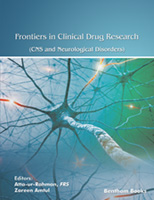Frontiers in Clinical Drug Research - CNS and Neurological Disorders is a book series that brings updated reviews to readers interested in advances in the development of pharmaceutical agents for the treatment of central nervous system (CNS) and other nerve disorders. The scope of the book series covers a range of topics including the medicinal chemistry, pharmacology, molecular biology and biochemistry of contemporary molecular targets involved in neurological and CNS disorders. Reviews presented in the series are mainly focused on clinical and therapeutic aspects of novel drugs intended for these targets. Frontiers in Clinical Drug Research - CNS and Neurological Disorders is a valuable resource for pharmaceutical scientists and postgraduate students seeking updated and critical information for developing clinical trials and devising research plans in the field of neurology.
The seventh volume of this series is edited by Dr. Zareen Amtul (University of Windsor, Canada) along with series editor, Dr. Atta-ur-Rahman. This latest volume features reviews that cover topics related to the treatment of neurodegenerative diseases (such as multiple sclerosis), tremors, epilepsy and stroke. The new volume highlights novel approaches to treating the mentioned conditions. The following list of chapters is featured in the volume:
- - Fatty Acid Amides as a New Potential Therapeutic Agent in Multiple Sclerosis
- - Epileptic Seizures Detection Based on Non-Linear Characteristics Coupled with Machine Learning Techniques
- - Hampering Essential Tremor Neurodegeneration in Essential Tremor: Present and Future Directions
- - The Potential Therapeutic Role of the Melatoninergic System in Treatment of Epilepsy and Comorbid Depression
- - Modeling Neurodegenerative Diseases Using Transgenic Model of Drosophila
- - Genetic Basis in Stroke Treatment: Targets of Potent Inhibitors
About the Editors:
Prof. Atta-ur-Rahman, Ph.D. in organic chemistry from Cambridge University (1968), has 1080 international publications in several fields of organic chemistry including 751 research publications, 37 international patents, 69 chapters in books and 221 books published largely by major U.S. and European presses. He is the Editor-in-Chief of eight European Chemistry journals. He is Editor of the world's leading encyclopedic series of volumes on natural products 'Studies in Natural Product Chemistry' 54 volumes of which have been published under his Editorship by Elsevier during the last two decades.
Prof. Rahman won the UNESCO Science Prize (1999) and was elected as Fellow of the prestigious Royal Society (London) in July 2006. He has been conferred honorary doctorate degrees by many universities including (Sc.D.) by the Cambridge University (UK) (1987). He was elected Honorary Life Fellow of Kings College, Cambridge University, UK, conferred the TWAS (Italy) Prize and the Austrian government has honored him with its high civil award ("Grosse Goldene Ehrenzeischen am Bande") (2007). He is Foreign Fellow of Chinese and Korean Academy of Sciences, Foreign Fellow of the Chinese Chemical Society and former President of Pakistan Academy of Sciences.
Dr. Zareen Amtul is a graduate in biochemistry with a specialty in neuroscience. She worked as a Fulbright visiting scholar at the Mayo Clinic Jacksonville, USA while completing her Ph.D. She worked as Alexander von Humboldt Fellow at Heidelberg University, Germany, as Ontario Mental Health Foundation, and the Canadian Institute of Health Research Fellows at Western University, Canada. Currently Dr. Amtul is working as a Senior Faculty Member at Windsor University, Canada. Dr. Amtul's main area of research has been chemical biology and medicinal bioinorganic chemistry. Dr. Amtul has also extensively researched the biochemical, molecular, and behavioral substrates of memory impairment in Alzheimer's disease, vascular cognitive impairment, stroke, depression, epilepsy, and frontotemporal dementia-related disorders. Lately, she has also started focusing on structural biology, bioinformatics, diagnostics, and drug development to propose novel diagnostics as well as designs of multifactorial neurovascular medicines using optogenetics, decoy, and Trojan horse technologies to treat epilepsy and AD, respectively. Besides teaching anatomy, physiology, and biochemistry, Dr. Amtul has also independently developed and delivered the curriculum of multiple new postgraduate courses in Neuroscience.
Keywords: central nervous system, medicinal chemistry, multiple sclerosis, essential tremors, neurology, epilepsy, stroke
For further information, please visit: https://bit.ly/3avTY49

